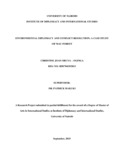| dc.description.abstract | Management of environmental issues have been gaining international attention and the
conflicts that are arising from the scarce natural resources cannot be solved without the call for
cooperation from both local and international stakeholders. The resultant pressures to the
environment emanating from human activities on natural resources have had the potential for
serious conflict. Due to the possible conflict in the sharing of the natural resources, there has
been need to employ environmental diplomacy in resolving these conflicts. Consequently, the
research objective was to establish the role of environmental diplomacy and conflict resolution in
the Mau forest. Specifically, this research used content analysis and survey methods. The content
analysis focused on environmental diplomacy mechanism in the Mau forest. The analysis was
limited specifically to the application of environmental diplomacy issues on the Mau forest
region. The issues examined include environmental awareness and environmental diplomacy at
the Mau. Evidence from the analysis of the study suggests that the interviewees decry the
environmental degradation that has occurred in the forest and a number of international and subregional
organizations are involved in the conservation and rehabilitation planning of the area.
Further, evidence presented herein indicates that there is need for a permanent demarcation of
the legal boundaries and assessment of critical water areas and title deeds issued. In addition, it
was found that there is need to establish community forest association as one form of
environmental diplomacy. Generally, environmental diplomacy was found to be a more effective
tool of conservation the Mau forest. Thus the study recommends an integrated approach to both
conflict resolution and dispute settlement mechanism in order to promote peace, coexistence and
participation of all the parties involved. There is need therefore for a review of the existing
conflict resolution mechanism so that it becomes an all inclusive process and enhance the
principle of public participation in natural resources management. | en_US |

